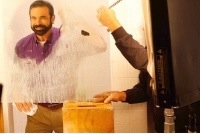I'll admit it. I'm an impatient person. I like to get to where I'm going as quickly as possible. That's true for my Vision, my goals, and typically - even my road trips. So I was not initially excited when my wife "kidnapped" me this past week and told me we were going on a road trip.
 Work has been stressful for awhile, and I've probably been less jovial than usual. Our 27th wedding anniversary is coming up, and she told me that we were going to escape life for a few days and head out to Gatlinburg, TN. I couldn't imagine what could be in Gatlinburg that was more important than what I was facing at work, but she persisted and we went.
Work has been stressful for awhile, and I've probably been less jovial than usual. Our 27th wedding anniversary is coming up, and she told me that we were going to escape life for a few days and head out to Gatlinburg, TN. I couldn't imagine what could be in Gatlinburg that was more important than what I was facing at work, but she persisted and we went.
 My first reaction was to pull up Google Maps and determine the most direct route to get there. But along the way she insisted that we leave the Interstate and just drive through the countryside. Despite my discomfort in doing this, I went along with her request. And after awhile, it occurred to me that it was the journey that was important in this case. The experience of getting there. We stopped at a winery, toured a distillery and even ate at the birthplace of KFC.
My first reaction was to pull up Google Maps and determine the most direct route to get there. But along the way she insisted that we leave the Interstate and just drive through the countryside. Despite my discomfort in doing this, I went along with her request. And after awhile, it occurred to me that it was the journey that was important in this case. The experience of getting there. We stopped at a winery, toured a distillery and even ate at the birthplace of KFC.
 Unlike most things I do in life, there was no agenda, no start or finish time and no due dates. It was just a time to be together and to take in the scenery. Why is it that this type of experience is so rare in our time-stressed culture? I have European friends that regularly take the entire month of August to just explore a new country or region. But we're so busy being busy that it seldom occurs to us.
Unlike most things I do in life, there was no agenda, no start or finish time and no due dates. It was just a time to be together and to take in the scenery. Why is it that this type of experience is so rare in our time-stressed culture? I have European friends that regularly take the entire month of August to just explore a new country or region. But we're so busy being busy that it seldom occurs to us.
 We work with consumers all the time. They all complain that there is not enough time in the day to get everything done. Products that make them more efficient are highly desired, as they imagine gaining more free time through the use of them. In reality, if we could free up 30% of a person's time, how long would it stay unstructured?
We work with consumers all the time. They all complain that there is not enough time in the day to get everything done. Products that make them more efficient are highly desired, as they imagine gaining more free time through the use of them. In reality, if we could free up 30% of a person's time, how long would it stay unstructured?
Maybe the biggest unmet need people have is not simply a new product, but a change in perspective. Maybe we should focus on helping more people just enjoy the journey...




 But today, more and more people are putting their entire lives on display for all to see. Rather than separating and projecting multiple images, people are becoming comfortable being who they are and not trying to be who people expect them to be.
But today, more and more people are putting their entire lives on display for all to see. Rather than separating and projecting multiple images, people are becoming comfortable being who they are and not trying to be who people expect them to be.


















